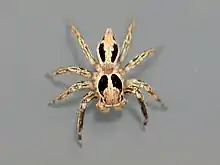| Plexippus petersi | |
|---|---|
_on_a_human_finger_at_golden_hour.jpg.webp) | |
| Male on a human finger | |
| Scientific classification | |
| Domain: | Eukaryota |
| Kingdom: | Animalia |
| Phylum: | Arthropoda |
| Subphylum: | Chelicerata |
| Class: | Arachnida |
| Order: | Araneae |
| Infraorder: | Araneomorphae |
| Family: | Salticidae |
| Subfamily: | Salticinae |
| Genus: | Plexippus |
| Species: | P. petersi |
| Binomial name | |
| Plexippus petersi (Karsch, 1878) | |
Plexippus petersi is a species of jumping spider native to Asia that has been introduced to Africa and Pacific islands.[1] The male is between 6 and 10 mm (0.24 and 0.39 in) in length, and the female is around 10 millimetres (0.39 in). This spider is commonly known as the tropical flycatcher[2] or small zebra jumper.[3]
Description
The male Plexippus petersi is between 6 and 10 mm (0.24 and 0.39 in) long and the female is slightly larger. The head bears four pairs of eyes, one pair is larger than the others, forward-facing and movable, while the remainder are small and fixed in position.[3] The cephalothorax is longer than it is wide and is brown with two darker reddish-brown bands on the dorsal surface. The abdomen is twice as long as it is wide and is yellowish-brown dorsally with two longitudinal darker brown bands which are broken posteriorly to give a pair of orangish spots on either side; the ventral surface is yellowish-brown and the spinnerets are greyish-brown. The pale parts of the abdomen are clad with whitish setae (bristles), and the darker areas are covered with brown setae. The legs are yellowish-brown, streaked with darker brown and darker near the joints, and have blackish-brown leading edges. There are scattered setae on the legs and the femur has a dense patch of brown hairs.[4]
Distribution
Plexippus petersi is native to Southeastern Asia. Its range includes Africa, China, Japan, Indonesia, New Guinea, the Philippines, Vietnam,[4] Laos,[5] Cambodia,[5] India, Sri Lanka, Malaysia and Australia.[2]
Ecology
Plexippus petersi is a house spider, living indoors, and admired for the skilful way it hunts and catches mosquitoes, flies and other invertebrates.[2] It has also been found living in crops in the Philippines, in one instance in a rice field infested with the armyworm Spodoptera mauritia, and in another, in a corn field attacked by the northern armyworm Mythimna separata.[4] This spider has been investigated as a control agent for houseflies and showed potential as a bio-control agent.
Gallery
References
- ↑ The World Spider Catalogue
- 1 2 3 Whyte, Robert; Anderson, Greg (2017). A Field Guide to Spiders of Australia. Csiro Publishing. p. 295. ISBN 9780643107083.
- 1 2 Hegde, Pradeep; Sagar, Sathya Chandra (2016). Guhanagari: A Book on Urban Wildlife at Christ University, Bengaluru. Christ University. pp. 32–33. ISBN 9789382305934.
- 1 2 3 Riceland Spiders of South and Southeast Asia
- 1 2 "Plexippus petersi". Global Biodiversity Information Facility. Retrieved 18 September 2021.
_(16314158032).jpg.webp)

